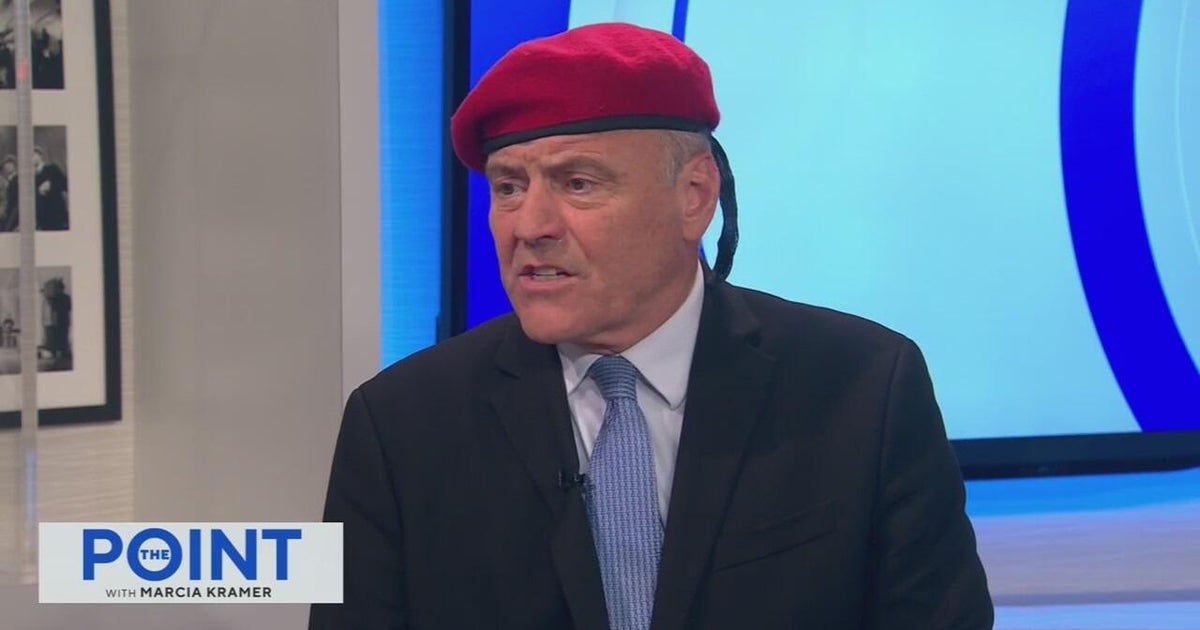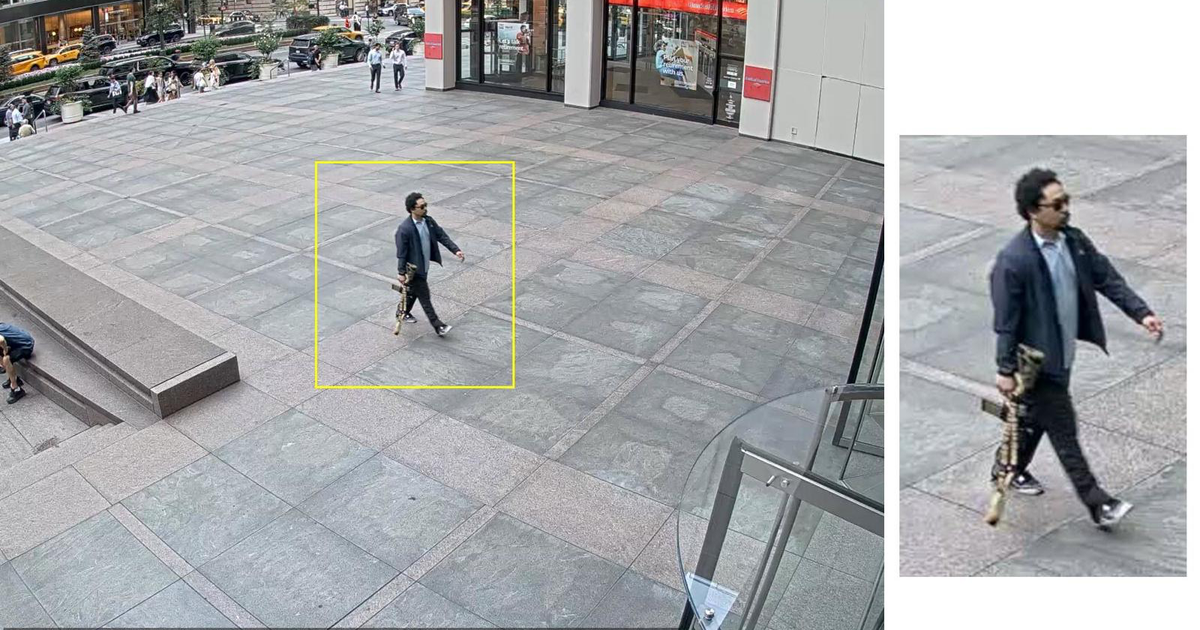Candidate Conversations: Ray McGuire
NEW YORK (CBSNewYork) – CBS2 is holding in-depth conversations with the 2021 New York City mayoral candidates.
We are asking each of them the same questions, so you can compare.
The order was chosen at random.
Here's Marcia Kramer's interview with Democrat Ray McGuire.
Marcia Kramer: From ending gun violence to recovery from the pandemic, the next mayor of New York City will have a lot on their plate. We're speaking with each candidate in an in depth conversation to see where they stand. We're asking each candidate the same questions, so you can compare. Joining me now is Ray McGuire. Ray, thank you so very much for joining us today.
Ray McGuire: Thank you, Marcia, for having me. How are you today?
Kramer: I'm good, thank you. And I'd like to jump right in with the first question, should you get elected, what would be your top three priorities on day one?
McGuire: My top three priorities when I get elected will be safety in our streets, it'll be the return of the economy, what I call the greatest most inclusive comeback in the history of the city. And it's education.
Kramer: About safety, how are you going to do it?
McGuire: Safety means that, you know, there are two or three aspects of safety. One, we need to get the guns off the street, we need to make sure that the spike in gun violence, up north of 100%, spike in murders, we need to address that immediately. And so I would make sure that I had all available resources to go in and identify where the guns are, and take those guns off the street. And I'd also commit all the resources necessary to prevent the circumstances that gives the rise to the violence that we're experiencing, and that's number one,
Kramer: And how do you? Go ahead...
McGuire: No, in terms of keeping with safety, so one is the violence. The other's making certain that our streets are safe, that New Yorkers, when they walk outside of their apartments need two things. We want two things. One, we want to make sure that the garbage is picked up and two we want to make sure that our streets are safe. And today, there's a lot of anxiety about safety in the streets having to do with those who are homeless, and also having to do with those who are mentally ill. And we need to address all three of those: Gun violence, those who are mentally ill, and the homeless situation exists on our blocks and on our subways and our public transportation system. We need to do that, we need to address that and we need to address it immediately.
Kramer: Well, do you think safety will prevent the economy from coming back?
McGuire: You know, they go one, they go together. So if people are not feeling safe, the likelihood of them returning to the office, and the likelihood of tourists coming, that's going to be constrained. So I would say yes, we need to deal with safety. We need to deal with safety. And as I outline and execute on my comeback plan, safety has got to be an essential part of that. So you need one - in order to have one, you need to have the other. They go hand in hand.
Kramer: So continuing the theme of safety, how do you square reducing the size of the police budget, which New York City has already done, with the need to keep the city safe and to deal with gun violence?
McGuire: Well we need to make sure that we invest in the neighborhoods, for one. I'm not for defund. I think we need to reallocate some of those sources of funds. We need to have a vibrant police force. And what I need, as a 6'4", 200 pound black man, I want the police to protect me and not profile me. So they're not incongruous. We can have our safe streets. We can also have a police force that's respectful, accountable and proportionate.
Kramer: So would you cut the size of the police budget if you got elected? Would you increase the size of the police budget? What are you talking about?
McGuire: I would reallocate the dollars. I would make, to make certain, if you look at, if we look at the details, the police budget, what has increased from 2010 to 2020. That which has experienced the most increase is administration. We've kept the actual police force, those who are walking around, that budget has been as big, $1.4 billion-1.6. So it hasn't increased that much. I'd make sure that we maintain that and also reallocate some of those resources into making sure we had community policing.
So I'd have community policing, I'd invest in the Cure Violence people who've been quite effective at reducing the violence, I would invest in community centers. And I would also invest in summer jobs.
So I would look at how we prevent a lot of what's taking place. And we can prevent that by returning to a relationship of respect, respect between the law enforcement and the community and accountability and law enforcement, which we haven't had, and for which we paid $200 million a year. So I would reduce that materially, in large part by holding those who are the serial abusers, who get a bad who create a cloud that is a bad cloud over the entire force. We need to address that we need to have that accountability.
Kramer: So Alexandria Ocasio-Cortez says that one of her prerequisites for endorsing a candidate is that they have to agree to cut the NYPD budget by $3 billion. Would you want her endorsement?
McGuire: Listen, I don't think it's appropriate to cut the NYPD budget by $3 billion. I have a different way to approach policing. And my policing is called a culture of respect, accountability and proportionality. That means I would appoint a deputy mayor for public safety, whose job is to help the day to day management of the NYPD also have relationships in the community. I would have a chain of command accountability. When one or more officers commence a overly aggressive act of policing, the entire chain will be held accountable.
I will also create a emergency social services office, 24 hours seven days a week of those mental health care professionals, given that four to five of the 10 calls, that today go into 911, has to do with mental health issues, I would invest in mental health care.
And the other thing that I would do for accountability, is I would have the CCRB have full investigative authority and rather than take 48 days to review video cam footage, I'd have them do it in 48 hours. They would review the entire file, they'd make a recommendation to the commissioner. And then based on that commissioners reaction, I would have the ultimate accountability. I am the leader of the city, so I should have the ultimate accountability.
Kramer: So the police commissioner right now argues that bail reform has to be changed saying that judges have to feel they can find a way to set bail for people accused of terrible crimes. I wonder if you agree with him that bail reform needs to be changed?
McGuire: I would say I understand the premise of bail reform, with which I agree. If two people commit the same crime for which the bail is $500, and one person has $500, and the other one goes to Rikers Island, the result of which is a Kalief Browder. That is not bail reform. That's what bail reform is intended to address. Bail reform is not intended to address those repeat offenders. So I would have some adjustments to bail reform, to make sure that we can keep the city safe, and that we can keep it or limit the number of acts that take place, especially by those repeat offenders.
Kramer: So what kinds of reforms would you like to see changed?
McGuire: Well, I think in the instances that repeat offenders, especially those who threaten harm to everyday New Yorkers, that we have a way for there to be discretion in the overall system. We need to make sure that we hold our judges accountable, while giving that discretion, which is also one of the issues that bail reform attempted to address. But we need to have confidence in the system, that with accountability, that we can make the appropriate adjustments, so that those serial abusers that we manage those serious serial abusers, especially those who are the are the biggest threats to how we think about ourselves. The threat to those who pose a threat to the covenant that we make with all New Yorkers. And that has to keep them safe. So I'd make the adjustments necessary to keep New Yorkers safe, while maintaining, while maintaining the original premise of bail reform. And we can do that. It's not one of the other. Adjustments can allow us to achieve that.
Kramer: So the number of homeless New Yorkers seems to be out of control. I wonder what your answer is, and whether you think that homeless shelters should be put in neighborhoods where the people who live there don't want them?
McGuire: So the answer is we have a homeless situation now that is much larger than what we've had historically, at least some belief, at least recent historical periods.
The first thing that we need to do with homeless is we need to prevent homelessness, we need to prevent homelessness. Which means that for those who, who decide, for whatever reason, that they're going to be part of the homeless population, we need to prevent that. And for those who are homeless, we need to make certain that we give them the services necessary, the wraparound services and then go from being homeless into a home.
My overall housing plan is going from homelessness to homeownership. So we need to do that. And I would make sure that we have the services that are necessary, that I would increase the number of vouchers given what is likely to be the eviction notices that we've delayed for quite some time to continue to delay the evictions. But let's get people from homeless.
The shelters today are dangerous, which is why many of those who are homeless choose to be homeless and not going to the shelters. We need to repair the shelters. But we're warehousing too many New Yorkers today. Tonight, we're going to have 50 plus thousand New Yorkers potentially in a shelter. The shelters are not safe places. So we need to address that.
Kramer: What about the people who say they who may have mental health problems, and are skittish about coming in and getting services? How do you convince them?
McGuire: Well listen, we we need to make sure that we we have an approach to mental health, and that challenge is only going to be not only for those who are identified today having mental health issues. But we need to make sure that we go closer to those children of ours who may be having mental health issues during a COVID, in a COVID environment.
Today, the stated national goal is to have one counselor for every 150 students. Today, I think that number is 700 to one. So we need to address that. So starting with our children, all the way up to our adults, make certain we have the appropriate services that we've invested in the community based organizations that allow us to deal with the mental those who are mentally ill. We also have laws in the book like Kendra's law, which we need to engage more on for those who, I'll say, allegedly, Rigoberta Lopez, who is a person who we've known that years of being mentally ill, and I say allegedly goes into a subway station and stabs two people. We need to balance our civil liberties with the threat to the lives of everyday New Yorkers. And we need to be able to strike we need to be able to strike that balance. And today we have not strike, we've not struck that balance, because we haven't engaged all the resources that are available to us, including Kendra's law.
Kramer: So what about people, people who send their kids to charter schools really love them. I wonder what your position is on charter schools and what you would do with Jewish private schools, who some people say are not offering enough of the secular education?
McGuire: So let me explain how so deeply personal this is. Education is how I got here. You know, my single mother, who worked at points in times three jobs, who became a social worker, sacrificed and prayed. And she along with my grandparents raised me and my two brothers. I didn't know my dad. And at any point in time, we had half a dozen foster children in our home. And based on my mother's sacrifices, at 16, I came east by myself. I took a Greyhound bus around New England, looking for education. And I landed at a school in Connecticut. And when I got to that school, the Hotchkiss School, my classmates had those short sleeve shirts with alligators cost worth my entire wardrobe. But that opened up my world, to yet another set of opportunities and I applied to colleges and was able to get into Harvard College, and then on the Harvard Law School and Harvard Business School. So education is so fundamental to who I am. And today, our children's lives are determined by their zip codes. And that shouldn't be.
If I randomly take 10 Black and Brown fourth graders, two, maybe three can read. So rather than this random pre-K to 12, we need to completely transform our world of education. And what I want my goal on which I want to be held accountable, is the best quality education and our district schools, and our magnet schools, and our parochial schools, and in our charter schools - we need to have the best quality education. And I want parents choice to be able to do that. So I'm for all of those.
Kramer: So what measures would you put in place to ensure there's no sexual harassment in the McGuire administration?
McGuire: I'd make certain, as I've done in my administration, in my in the private sector world, where this was taken as seriously as it is in the public sector world, having led and managed a business for 13 years, longer than anyone else in the history of that business, anyone else, and did it globally. I had the highest standards available to us. So that if there was any indication, and I relied heavily on the resources that I had, the relationships that I had, including human resources, Relationships. And to make sure were if there any hints of any kind of harassment, that we identified it and eliminated and took appropriate action, including dismissing those who may have been involved with it. If not dismissing, certainly there were severe consequences. I would do the same thing in my administration. It is not something that I would tolerate. We need to address it swiftly and take swift action and be definitive in that in that action. And I would want to be held accountable for that.
Kramer: So given rank choice voting, who should your supporters choose in second place after they voted for you in first place?
McGuire: You know, as I think about this ranked choice voting, rank Ray one, choose Ray and vote for Ray.
As I think about number two, I just want to make certain that we have somebody who can steward this city forward, given the crisis in which we find ourselves. You know, I come to this without owing any favors to anyone - bupkis, zero. We need a leader who's not beholden to any kind of, who can lead without being beholden to any constituents, any special interests. And what I say is that for many of those who are running, they had their chance. They had their chance. We've gone backwards. New Yorkers want something new. I'm an outsider, I don't have those allegiances. So my sole focus is going to be what's in the best interest of all New Yorkers, especially those who have not been included. Especially those who have not been included.
And so I come to this with a little different perspective, maybe a very big perspective as an outsider. I'm not a career politician. And I respect those who have served and served with legitimate successes and substantive successes, but we simply can't continue to manage by press release. We need a manager. And we need to have somebody who's got a proven track record of having actually executed. And I have a track record of having created more opportunity and created more wealth than all the other candidates combined.
So I look at that track record and what the neighborhood they call, with the millennials call, I have receipts. So as I think through the field, I need to continue to think through who's got receipts enough to go and leave the city. And oh, by the way, it shouldn't be that someone's first job is running New York City. This is not that we need somebody in whom this city can trust and whom they can believe. Who's got a proven track record of having manage, which I do, I've managed through the crisis.
Kramer: So you're saying that your outsider status is a good thing, because you don't owe anybody any, any political debt?
McGuire: Well, it not only is a good thing, because I don't owe any political debt. It's a good thing because it allows me to serve New Yorkers with the sole focus on what's in the best interest of New Yorkers. It also allows me to serve because I have perspectives that are different perspectives. It allows me to serve because I'm not constrained. It allows me to consider, it allows me to serve because my truth is my truth. I don't have to remember tomorrow what I told you today, because my truth's not gonna change. I am who I am. My word is my bond, I would not have survived as long as I survived in one of the most competitive industries. And when I came into that industry, there were one or two people who look like me. So I have faced conscious and unconscious bias, I've had to kick down the doors to get to a position of leadership in one of the most competitive industries that exist anywhere, and stay there longer than anybody else has stayed there.
So when New Yorkers look at somebody who can represent them, who represents the change that will make sure that they're included, because I got a track record of being, of making certain that people who have been excluded, get included, and fighting for New Yorkers to be included, and fighting for New Yorkers to come back. And my greatest most inclusive economic comeback plan. And fighting for New Yorker to get the proper education and fighting for the small businesses, and fighting for the not for profits and arts, education and culture, and fighting so that the best days of our city are ahead of us and not behind us. New Yorkers want that. They want somebody who will represent them, who represents the change that they so desperately, that we so desperately need. That's what New Yorkers are telling me.
Kramer: So we're going to move to a segment of our show that we call in one word. So in one word, what do you consider your best leadership quality?
McGuire: Integrity.
Kramer: In one word, friends and family would describe you as?
McGuire: Generous.
Kramer: So what's your favorite comfort food?
McGuire: My favorite comfort food? Probably Nathan's French fries.
Kramer: Wow. Name a unique skill or talent?
McGuire: Unique skill or talent? My jump shot.
Kramer: And you like to do this when faced with a difficult situation?
McGuire: Pray. Faith. This has been a walk of faith. So it will continue to be a walk of faith.
Kramer: Ray McGuire, thank you so much for joining us today.
McGuire: Thank you so much, Marcia Kramer for having me. I've enjoyed being here. And I have so much respect and admiration for your journalism. So thank you for giving me the opportunity to talk to New Yorkers. I love the city and you've allowed me to express that love.
You can watch our New York City mayoral debate with leading contenders on CBSN New York and on CBS2 hosted by Kramer and Maurice Dubois on Thursday, June 10 at 7 p.m.



